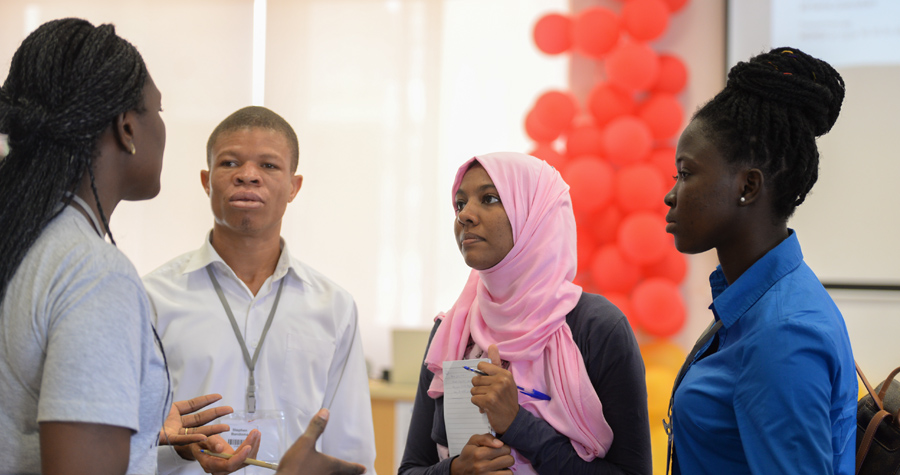
Accra, Ghana’s capital city, generates over 2500 tonnes of plastic waste daily, yet only 2% of this is recycled. The rest is usually improperly disposed-off in dumps, drains, landfills and along roads. For Ashesi recent graduate Elona Doe-Bansah ’19, one way to increase recycling is through the introduction of compartmentalised bins, so people can easily sort their trash for collection by recyclers. At the Mastercard Scholars convening, a weeklong boot camp held at Ashesi, she teamed up with colleague students to design a business plan around the solution.
Since the inaugural meeting in 2017, the annual convening has provided a platform for MasterCard scholars in institutions across Ghana to learn new skills and deepen their connections. Over a hundred scholars were at this year's convening, coming from the University of Development Studies, the Kwame Nkrumah University of Science and Technology, the University of Education, Winneba, and the African Institute of Mathematical Sciences, Ghana.
With a focus on entrepreneurship, this year's event also saw participants engage in workshop sessions, masterclasses, and programs focused on building skills in entrepreneurship. Over a hundred scholars, like Elona, got to build business ideas around some of the pressing problems they see in their communities. Working in teams, the students' ideas ranged from reducing import deficits to improving sanitation.
The emphasis on entrepreneurship at this year's convening, is in line with a commitment from the Mastercard Foundation to enable young changemakers to create economic opportunity in Africa. In 2018, the foundation announced the introduction of a $2 million fund, distributed across universities and institutional partners included in the Mastercard Foundation Scholars Program, towards local entrepreneurial activity.
“We are compelled by the leadership of African youth and the vision they hold for the continent’s future,” said Shona Bezanson, Associate Director of the Mastercard Foundation Scholars Program. “Whether it is providing quality education for refugee youth and children in Uganda, developing organic and cost-efficient fertilizers for low-income farmers in Zimbabwe, or creating a ‘Made in Africa’ brand that employs vulnerable artisans, Scholars are already activating their ideas for change with modest resources. We believe Scholars will seize this new opportunity to lead change in their communities.”

"We thought that it would be great to prepare scholars across various partner institutions, to leverage this opportunity to start business ideas," shared Lena Korsah, Senior Financial Aid Officer at Ashesi, who helped organise the convening.
“Africa’s young leaders are brimming with talent, ideas, energy, and a deep desire to have a positive impact on their communities,” explains Ashley Collier, Manager of Youth Engagement and Networks at the Mastercard Foundation. “Yet few young people receive the support and tools they need to ensure a project or social venture they want to undertake is successful.”